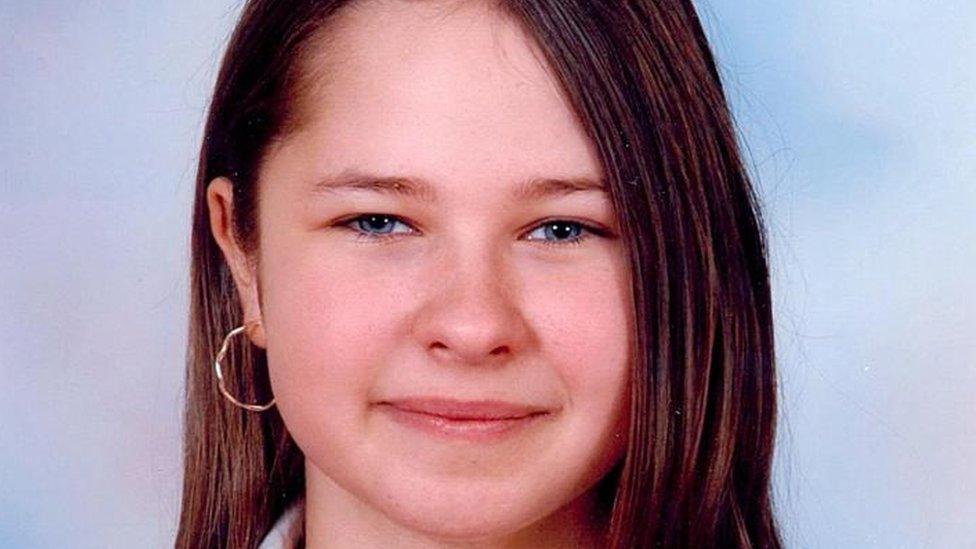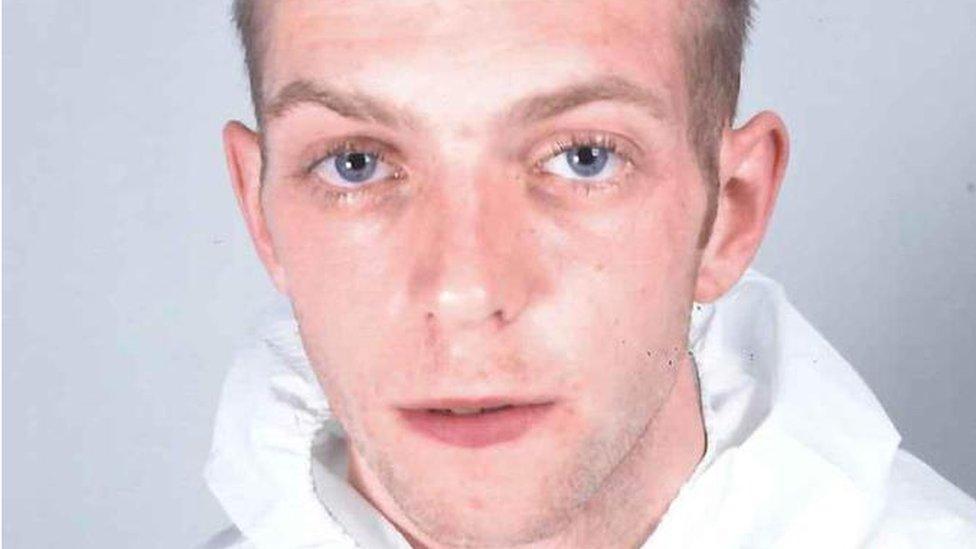Michelle's Law: Father's anger at 'zero' action
- Published

Michelle Stewart was 17 when she was stabbed to death by her ex-boyfriend
The father of a teenager who was stabbed to death by her ex-boyfriend says he feels let down by "zero" action on promised changes to the system.
Seventeen-year-old Michelle Stewart was murdered by John Wilson, then aged 20, in front of her friends near her Ayrshire home in 2008.
The killer was given a sentence of at least 12 years and Ms Stewart's family claim he is due for parole in November.
They have spent years campaigning to strengthen rights for victims of crime.
Her family wants a range of measures to be introduced, which they have called Michelle's Law.
They called for the welfare of victims and their families to be taken into account when parole and early release are considered, as well as the creation of "exclusion zones" where offenders cannot go during early release.
They also want improvements to the victim notification scheme so families are given reasons for an offender's release.
Michelle's family first met Scotland's Justice Secretary Humza Yousaf in August 2018.
Following their meeting, Mr Yousaf said much of what was being sought by the Stewart family could easily be introduced and he would seek to see how that was possible.
Michelle's loved ones - who had complained that the original sentence was too short - have described their anger at seeing pictures of a man they believe is Wilson on social media during recent periods of temporary release.

Michelle's father Kenny says there have been no changes
Kenny Stewart, Michelle's father, told the BBC: "We heard he was out via social media in Ayr. We weren't notified. I could have bumped into him.
"I don't want to be driving down the street and seeing him. It is like provocateur. They should not be putting me in that position."
Two years on from the initial meeting with the justice secretary, the family are due to conduct an online discussion with Mr Yousaf on Monday.
Mr Stewart said: "In the two years there have been no changes. There was a proposal for change for the Scottish parole board and how people, like me, could get more of a say. It was a great thing but it has disappeared. I don't know what has happened to it.
"I thought it was becoming law but it has disappeared. He [Mr Yousaf] did set up a taskforce but what has it actually done? Zero."
Ahead of the Monday meeting, Mr Stewart said: "I will say to Humza that he looked me in the eye and shook my hand and guaranteed changes but where are they?
"It can't be that hard because you can see how quickly they can change the laws for the Covid situation. They can swap laws upside down if they want."
Michelle's family have been supported in their campaign by the Scottish Conservatives, who said the Scottish government had initially pledged urgent action to improve victim's rights.
But the party's justice spokesman, Liam Kerr, said: "Instead, the SNP government's response to Michelle's Law has been non-existent. Her family are angry and feel betrayed.
"For both parole and temporary release, none of the campaign's demands have been met on exclusion zones, explicit safety requirements, publishing reasons for release and giving families the right to attend hearings.
"It's no wonder that Nicola Sturgeon struggled to defend her record on it last week when Ruth Davidson raised this at First Minister's Questions."

John Wilson was given a life sentence with a minimum term of 12 years
The justice secretary told the BBC he was "surprised" Mr Stewart thought no progress had been made.
Mr Yousaf said the "transforming parole consultation" had taken on board much of what the Michelle's Law campaign had asked for.
"There has been a number of changes made or explored," he said.
"For example, I announced changes which I hope will allow victims and their families to attend parole hearings in person. We have piloted that and are working through some of the issues.
"We are also very keen to strengthen the potential for exclusion zones, which is something the parole board can do currently and we are looking to see where we can strengthen that."
Mr Yousaf added: "Maybe what we need to do better is communicate where progress is being made.
"Some of it is still in train and I can appreciate that can sometimes looks like the progress has not been made but it is being made and I look forward to hearing from the Stewart family what more they would like the government to do."